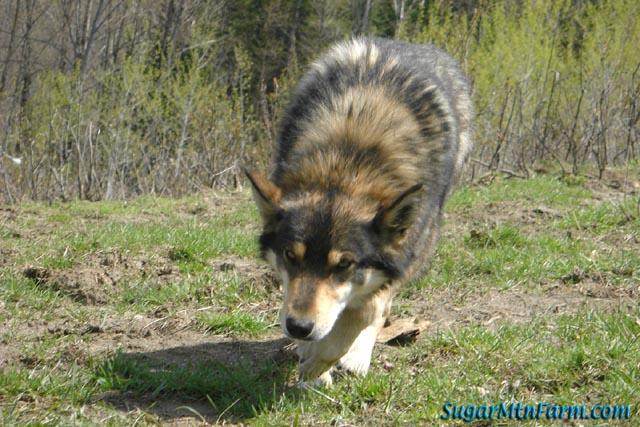




paul wheaton wrote:This thread has taught me something I didn't know about Bill. Certainly some things worth considering.
I am a big fan of cats and am struggling with the idea of not having cats on a permaculture farm.
Cliff (Start a rEVOLution, grow a garden)








 Wolves are an apex predator. Humans just think they're higher.
Wolves are an apex predator. Humans just think they're higher.









 .
.
A human being should be able to change a diaper, plan an invasion, butcher a hog, conn a ship, design a building, write a sonnet, balance accounts, build a wall, set a bone, comfort the dying, take orders, give orders, cooperate, act alone, solve equations, analyze a new problem, pitch manure, program a computer, cook a tasty meal, fight efficiently, die gallantly. Specialization is for insects.
-Robert A. Heinlein




 1
1




That's my opinion and I'm sticking to it, unless someone yells at me or something.




I am the first generation of my family to grow up on the grid eating out of the super market. I hope to be the last.
 1
1




Nickolas Mcsweeney wrote:Hello everyone, i am new here but i am not new to permaculture. Bill Mollison states in a few of his permaculture books that there is no place in the permaculture system for cats(please correct me if you think i am wrong). so does anyone disagree with him on this?




Rick Freeman
Interface Forestry, l.l.c. http://interfaceforestry.com
rick@interfaceforestry.com








Frank Callo wrote:As I see it, the biggest problem with cats is that they reproduce pretty prodigiously. I live in an urban environment and the feral cats are something of a neusance









Frank Callo wrote:We could make a whole other thread out of the predator/prey imbalance.













Sustainable Plantations and Agroforestry in Costa Rica




























Xisca - pics! Dry subtropical Mediterranean - My project
However loud I tell it, this is never a truth, only my experience...








Xisca - pics! Dry subtropical Mediterranean - My project
However loud I tell it, this is never a truth, only my experience...
 2
2
























 1
1




A human being should be able to change a diaper, plan an invasion, butcher a hog, conn a ship, design a building, write a sonnet, balance accounts, build a wall, set a bone, comfort the dying, take orders, give orders, cooperate, act alone, solve equations, analyze a new problem, pitch manure, program a computer, cook a tasty meal, fight efficiently, die gallantly. Specialization is for insects.
-Robert A. Heinlein




Brenda Groth wrote:love those upside down teases..of course this means I'm UPRIGHT..
I will admit my cats do eat a lot of birds..which I do frown upon..however..we still have lots of birds..
Actually do believe that my big cat would eat chickens if i had them, that is why I don't..he eats rabbits and anything smaller and when he was about 6 mo old he took down a fawn..or tried to..but we didn't let him keep the fawn. (he was just playing, he wouldn't have eaten it)
Ann in theCentral Maine Highlands, cool side of zone 5
check out my etsy store https://www.etsy.com/shop/resnaturae
 4
4




 2
2




A human being should be able to change a diaper, plan an invasion, butcher a hog, conn a ship, design a building, write a sonnet, balance accounts, build a wall, set a bone, comfort the dying, take orders, give orders, cooperate, act alone, solve equations, analyze a new problem, pitch manure, program a computer, cook a tasty meal, fight efficiently, die gallantly. Specialization is for insects.
-Robert A. Heinlein








A human being should be able to change a diaper, plan an invasion, butcher a hog, conn a ship, design a building, write a sonnet, balance accounts, build a wall, set a bone, comfort the dying, take orders, give orders, cooperate, act alone, solve equations, analyze a new problem, pitch manure, program a computer, cook a tasty meal, fight efficiently, die gallantly. Specialization is for insects.
-Robert A. Heinlein




Hazel Reagan wrote:I was told by an Intern from Norway, he heard on a radio new station that there was a Chef in Italy who served cats and they were good. I never thought about eating predators before. Has any one tried them? If not for personal use, they might make good dog food. I have a problem sometimes with ferals.
Permakultur i Norge: www.permakulturdesign.no




A human being should be able to change a diaper, plan an invasion, butcher a hog, conn a ship, design a building, write a sonnet, balance accounts, build a wall, set a bone, comfort the dying, take orders, give orders, cooperate, act alone, solve equations, analyze a new problem, pitch manure, program a computer, cook a tasty meal, fight efficiently, die gallantly. Specialization is for insects.
-Robert A. Heinlein

| I agree. Here's the link: http://stoves2.com |




